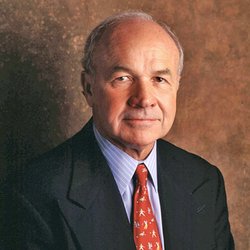 In this International Herald Tribune article, Michael Oxley — the “Oxley” of the Sarbanes-Oxley corporate governance statute — confirms the vacuous nature of the politicians who passed that destructive law and encouraged the destruction of Arthur Andersen and various Enron executives:
In this International Herald Tribune article, Michael Oxley — the “Oxley” of the Sarbanes-Oxley corporate governance statute — confirms the vacuous nature of the politicians who passed that destructive law and encouraged the destruction of Arthur Andersen and various Enron executives:
Presiding over a recent dinner in Paris for more than 200 accountants, Oxley — the former Republican congressman from Ohio and co-author of the Sarbanes-Oxley corporate governance law — was asked during the question period whether he realized he had helped create one of the most crushing financial burdens ever imposed on business.
Was Oxley aware, his questioners asked, that the law that he and Senator Paul Sarbanes, a Maryland Democrat, rushed onto the books five years ago after the collapse of Enron and WorldCom had contributed to a sharp decline in listings on U.S. stock exchanges? And, knowing what he knows now about the cost and effects of the law, would Oxley — who retired in January after 25 years in Congress — have done it any differently?
“Absolutely,” Oxley answered. “Frankly, I would have written it differently, and he would have written it differently,” he added, referring to Sarbanes. “But it was not normal times.” [. . .]
“Everybody felt like Rome was burning,” Oxley, 62, recalled during an interview after the dinner in Paris. “People felt like they were getting cheated. It was unlike anything I had ever seen in Congress in 25 years in terms of the heat from the body politic. And all the members were feeling it.”
Until that moment, a bill to tighten corporate controls had been languishing in the Congress for years, held back by lobbying by big business. But suddenly, the impetus was there, and the firestorm led Oxley, then head of the House committee that oversees America’s financial services industry, to quickly push forward a solution based on that measure to calm the hysteria of voters.[ . . .]
in the summer of 2002, with pressure also mounting from the administration of President George W. Bush, there was no question that the bill needed to be pushed through, however imperfect.
“The president called Paul and I down to the White House almost immediately after the Senate passed its bill, 97 to 0” on July 15, Oxley recalled.
“I remember it was in the Cabinet Room and you could see the pressure he was under because the Democrats were pressing his relationship with ‘Kenny boy'” — a reference to Kenneth Lay, the chief executive of Enron, who had sought help from the administration to avoid a bankruptcy filing in the weeks before the giant energy trading company collapsed.
“The president basically said, ‘Get this wrapped up,'” Oxley said. The House and Senate quickly agreed on a new draft, and Bush signed the bill into law on July 30. [. . .]
A month later, Arthur Andersen, the accounting firm that had been convicted of obstructing the government’s investigation into the collapse of Enron, declared bankruptcy after 89 years in business, crushed by Enron-related liabilities.
The Andersen prosecution was “a White House decision,” Oxley said. “They had to really look tough and so they decided at the highest levels they were just going to give the death penalty to Arthur Andersen.”
“I think at the end of the day virtually anyone would agree it was a terrible decision, because you eliminated a major accounting firm,” he added, “and you just sent a chill through the accounting industry.”
Read the entire article. Yet another example of the legislative overreaction to a perceived problem being far worse than the problem itself.









